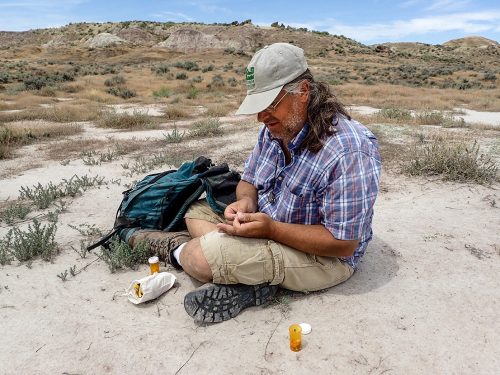GAINESVILLE, Fla. — Florida Museum of Natural History department chair and vertebrate paleontology curator Jonathan Bloch is featured in the Public Broadcasting Service “Polar Extremes” program airing Feb. 5 at 8 p.m. EST.

The two-hour NOVA series special reveals the bizarre history and explores the future of the Earth’s poles. Paleontologist and host Kirk Johnson of the Smithsonian National Museum of Natural History explores the causes for the dramatic changes to the poles, from lush forests to ice sheets, and reveals what we can learn from them about the present and future of the planet’s climate.
Bloch discusses the Paleocene-Eocene Thermal Maximum, or PETM, during his segment filmed at the Bighorn Basin in Wyoming. The PETM was a rapid global warming event that happened about 55.8 million years ago, when a massive amount of carbon released into the Earth’s atmosphere caused global temperatures to spike, resulting in dramatic responses by plants and animals. By studying the PETM and its effects, scientists hope to predict the impacts of human-driven climate change.
“As we think about future global warming we look to past examples to see how plants and animals might respond,” Bloch said. “In the PETM we are looking back to a world with no ice on the poles. What we see with global warming during this time are major shifts in geographic ranges in both plants and animals, dwarfing in many mammals, and the origin of certain modern mammals including primates and horses.”
Bloch’s research and collaborations have shed light on the origins of modern primates and the effect of higher temperatures on mammals. He was also part of the team that discovered Titanoboa, the largest snake ever known. He is also one of the leaders at the Florida Museum’s five-million-year-old Montbrook dig site in Willison in Levy County which has yielded more than 35,000 fossils.
The program will air on WUFT in North Central Florida and will be screened at the Hippodrome Theatre on Jan. 29 at 6 p.m. The event is free but reservations are required. For more information or to sign up, visit www.wuft.org/free-screening-of-polar-extremes.
-30-
Writer: Nikhil Srinivasan, nsrinivasan@flmnh.ufl.edu, 352-273-2034
Source: Jonathan Bloch, jbloch@flmnh.ufl.edu, 352-273-1938
Media contact: Paul Ramey, APR, pramey@flmnh.ufl.edu, 352-273-2054